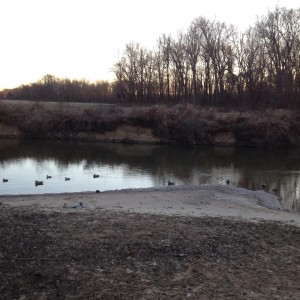
It’s 4:00AM, 7 Degrees Fahrenheit, and you’re carrying 40-50lbs of gear for a mile or more, while wearing clothes that restrict your field of motion. To top it off, you know that when you reach your destination, you will stand in 4 feet of water for 3-4 hours. Nope! You’re not in Army Basic Training, you’re duck hunting. If you are not an outdoorsman, chances are that you know one. Outdoorsmen like myself can easily spend upwards of $1000 on licenses, gear, weapons, and ammo every season. This year, in Tennessee, I paid a total of $112.00 to fish, as well as hunt deer, ducks, and small game animals on Tennessee Wildlife Resources Agency Land. This year, in Mississippi, I paid $96.58 to hunt ducks and small game, and paid $10.29 for a 1-day fishing license, coming to a grand total of $106.58. In Arkansas, I paid $23.00 for a 3 day fishing license and a yearly trout stamp. In addition, to the state license fees, I had to buy a $15 federal duck stamp in order to be eligible to purchase a waterfowl license in any state. In total, in the 2013-2014 year alone, I paid $256.58 just for licenses. This does not include the cost of any equipment.

Now, most, if not all outdoorsmen that I know buy every license they will need for the year in order to stay legal. Contrary to popular belief, when you buy your hunting/fishing license, you are not cleared to hunt or fish any animal you see. To hunt deer and fish for most fish in Tennessee, you will pay $28. However, if you want to fish for trout in Tennessee, you will have to pay $18 on top of your $28 license. Waterfowl also requires a separate license, although it will cost $48 ($31 for Waterfowl, $2 for migratory bird, and $15 for a Federal Duck Stamp), on top of your $28 hunting/fishing license. Although it can cost a large sum of money, we do this every year, typically without questioning where the money actually goes. After 6 years of being required to pay for licenses, I’ve decided to find out. If I have to pay $250+ to hunt and fish for one season, I want to make sure that my money is being well spent. I will find where my money goes in Tennessee and Mississippi, and federally.

Although hunting and fishing is regulated on a state level, you do have to purchase a $15 Federal Duck Stamp if you intend to hunt ducks in any state. According to the US Fish and Wildlife Service, for every dollar spent on a duck stamp, $0.98 of it goes directly towards purchasing land for wildlife preservation. This means that $14.70 of your $15 Duck Stamp goes to making sure that ducks have a safe place to live. According to the US Fish and Wildlife Service, since the creation of the duck stamp in 1934, it has raised over $700 Million that have been used to purchase more than 5.2 million acres of preservation land. Paying $15 per year to keep ducks in good population is one great deal!
Now, we move on to the state level, starting with Tennessee.
The Tennessee Wildlife Resources Agency (TWRA) is what regulates hunting and fishing in our state. In Tennessee, as stated on the TWRA Website, almost 100% of TWRA’s operating costs come directly from hunting and fishing licenses and federal excise taxes. Hunting and fishing licenses, combined with the federal excise taxes on ammunition and marine equipment and fuel help to pay for many of the restockings, restorations, and preservation projects in Tennessee, as well as many of the other operating costs that TWRA has. Overall, your money spent on a license in Tennessee is definitely not going to waste.

The Mississippi Department of Wildlife, Fisheries, and Parks uses their money in similar ways. The MDWFP states that “The MDWFP’s annual budget is unlike that of many state agencies; approximately 90% of this budget is derived from user generated funds rather than state tax funds. Primary funding sources include hunting and fishing license sales, permit and registration fees, and federal excise taxes on hunting and fishing equipment.” With the funding from your license fees and other purchases, they have done great things to help wildlife in Mississippi. They have restored several populations of animals to normal levels, taught the public information on hunter’s safety, as well as information on how manage your land to support wildlife. They have also used the money to help improve parks and enforce daily limits on animals hunted and fished for. Just like the money you pay for a license in Tennessee, your money goes towards a great cause.
As an avid outdoorsman, knowing this makes me happier. For years I’ve wondered if my money is actually used by the wildlife agency in each state that I hunt or fish in. Although I spent over $250 on licensing alone, it definitely helps the outdoors community. The people who don’t buy licenses because they think it is a waste of money are very mistaken. By not purchasing your license, you are stealing money that is used to build habitats and pay for wetlands and wildlife management areas. So, next time you decide to go hunt or fish, remember to buy your license. The little bit of money you spend on a license will ensure that your children… and their children, will have a good population of animals to fish and hunt.





